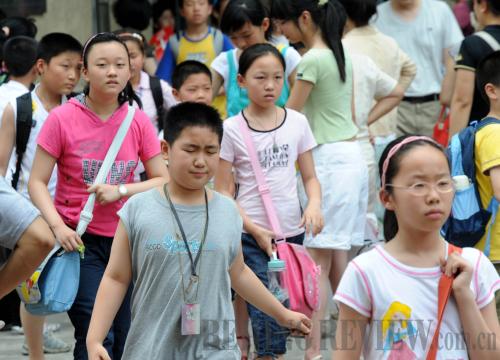|
 |
|
BUSY VACATION: Students of a school in Nanjing, Jiangsu Province. Extra classes mushroom in many parts of China in the summer vacation despite education authorities' bans (SUN CAN) |
Safety Concerns
The Ministry of Health recently denied claims milk powder made by a Chinese company caused three baby girls to grow breasts. Officials said investigations found the milk powder was not responsible for the premature breast growth, as its hormone content was within normal standards. The public is relieved by the news.
When the "premature puberty" accusation was first reported by the media, it raised many questions about hormones in dairy products and triggered fears of problems caused by toxic chemicals-contaminated vegetables and poultry.
Though the milk powder in question has proved safe, concerns about China's food safety monitoring remain high.
Food safety is by no means insignificant. When doubts about food safety arise among the public, authorities must work quickly to provide information. The public will surely develop more doubts when new food safety risks are found, so it's important to make food safety monitoring and supervision a regular practice. Authorities are supposed to deal with discovered problems as soon as possible. It is also necessary to issue food safety investigation results regularly. (See page six)
Beijing Times
Misleading Data
Fuping County in north China's Hebei Province is economically less developed. Its fiscal revenue was less than 100 million yuan ($14.7 million) in 2009. As the county is trying its best to attract investment, some officials have used fabricated data to show off its achievements. For example, a project worth 3 million yuan ($441,000) was reported to the higher-level government as worth 100 million yuan.
Fuping is just one of the many areas of reporting fake data.
Compared with the huge benefits it entails, the cost of being deceitful is very low due to ineffective supervision. As a result, fake data have become almost a common phenomenon.
Ordinary people are indignant about the situation but are unable to prevent scenarios of this type from happening.
Worse still, fake data are putting the government into crises of credibility.
Changjiang Daily
Exhausting Studies
Since the summer vacation started, in south China's Guangdong Province, there has been a surge of extra classes for primary and middle school students. A 10-year-old ban on these classes is now a mere scrap of paper. Education departments at various levels have been trying to end the messy situation of extra classes, but students are still paying to take them in various forms.
Extra classes in the summer vacation are an outdated educational mode, because they take up students' legal rest days and create more burdens for them. Besides, it's illegal teachers charge students fees for extra classes during the compulsory education stage.
Some schools say, in an examination-oriented education system, stuffing students with knowledge and forcing them to do as many exercises as possible are the only solutions. In fact, it is also a lucrative industry. Teachers may earn handsome incomes during the two months' summer vocation.
Parents all hope their children will have a bright future and are willing to pay for teachers' extra instructions. But teachers should no longer be enslaved by money.
Western China Metropolis Daily
English Frenzy
After a month of seeking public feedback, a program on foreign language learning in Beijing in 2011-15 has been completed. In the original draft, Beijing's kindergartens were required to open English classes in the next five years. Fortunately, the final version doesn't make it compulsory.
In China, education authorities require students to start learning English in grade three of primary schools, but in many places, English classes are available for grade one students. English is important in today's world. But is it really so important the whole nation has to start learning it at an early age?
In China, a student must complete 12 years of schooling before entering college. English learning accounts for about one third of the time. But it's still not easy for most college students to read English publications or talk fluently in English. While those who can do simultaneous interpretation are difficult to find, a large number of graduates majoring in English can't find work.
The World Expo in Shanghai is badly short of volunteer translators and interpreters of non-English languages. In the meantime, organizers have to reject a swarm of students who have passed the national English proficiency test, but are poor at using English.
At a time of globalization, learning foreign languages is necessary. What is important is how many resources we need to put into this. For kindergarten children, it's more important to teach them how to speak the mother tongue well and how to communicate well with others.
Oriental Morning Post | 